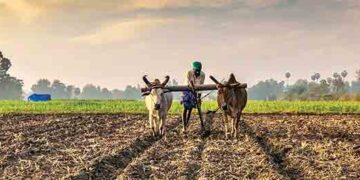 THE timing of the Government-appointed committee on farm issues submitting its recommendations depends on the outcome of the meeting of the two sub-groups that are looking into some vexed issues. The groups, addressing issues on import and export of farm produce and the minimum support price, will meet in the early part of the month. Both the meetings will be held in New Delhi.
THE timing of the Government-appointed committee on farm issues submitting its recommendations depends on the outcome of the meeting of the two sub-groups that are looking into some vexed issues. The groups, addressing issues on import and export of farm produce and the minimum support price, will meet in the early part of the month. Both the meetings will be held in New Delhi.
The Centre constituted this committee through a notification dated July 18, 2022. It consists of representatives of farmers, eminent agriculture economists, scientists, as well as representation from the Union and state governments. Former Agriculture Secretary Sanjay Agrawal is the Chairman of the committee.
Effective, transparent MSP
The committee convenes “on regular basis to make suggestions so as to make Minimum Support Price (MSP) more effective and transparent; to promote natural farming; to change crop pattern keeping in mind the changing needs of the country”, according to a statement from the Department of Agriculture and Farmers Welfare.
Till April 17, members have had “three main meetings along with fourteen sub-groups meetings have been held till date,” the communique said.
It was constituted in keeping with the announcement of Prime Minister Narendra Modi that “A committee will be constituted to promote zero budget-based farming, to change crop pattern keeping in mind the changing needs of the country, and to make MSP more effective and transparent and that the committee will consist of representatives of the Central Government and state governments, farmers, agricultural scientists and agricultural economists”.
Politics vs. welfare
The committee was originally intended to comprise 29 members, including its Chairman. But the umbrella of farmer organisations that laid a siege of Delhi for a year decided to boycott it. Despite their demands for certain changes in MSP, the Samyukta Kisan Morcha (SKM), which was offered three spots in the body, refused to nominate any representative. The Government made several overtures to the SKM since talks began on the three farm laws which now stand repealed. Later, similar efforts were undertaken for joining the committee, but Morcha leaders have so far remained unmoved.
The political intent of SKM leaders was soon evident. While some went on to contest elections, the rest of the union stalwarts started visiting states going to polls. These leaders then openly exhorted voters to turn against Narendra Modi and the Bharatiya Janata Party (BJP). The political overtures were evident, including West Bengal in 2021, to Karnataka, which will witness Assembly election on May 10.
Focus on business
Meanwhile, the committee went about its business undeterred, beginning with its Delhi meeting held on August 22 last year. Its members went on to form sub-committees on various nuances of farm issues, which included – apart from MSP – the issues on import and export of produce, crop diversification, working of cooperatives, and natural farming.
In what was its last meeting at the time of writing, held in Lucknow on April 21, the sub-committees are said to have submitted their reports. The two meetings to be held in Delhi in May intend to address certain vexed questions like legalisation of the MSP.
The MSP question
The MSP is announced by the Government for 23 major crops as per the recommendations of the Commission for Agricultural Costs and Prices (CACP). Such prices are 1.5 times the cost of cultivation to account for inflation. While considering the price, CACP includes factors like the cost of production, demand-supply conditions, domestic and international prices, inter-crop price parity, and the terms of trade between agricultural and non-agricultural sectors, etc.
Farmer leader Anil Ghanwat has repeatedly said that to legally guarantee MSP for all 23 crops would make the state or Union Government bankrupt. Agriculture economist Ramesh Chand of Niti Aayog believes that if the Government starts buying more crops at MSP, then it will be “fiscally ruinous”.
Data shared by Government representatives in meetings estimates a spend of over Rs. 17 lakh crore if the MSP is legalised. And according to Budget Estimates 2023- 24, the total expenditure is estimated to be Rs. 45 lakh crore. Thus, the expense is about 38 per cent of the total estimated expenditure.
































